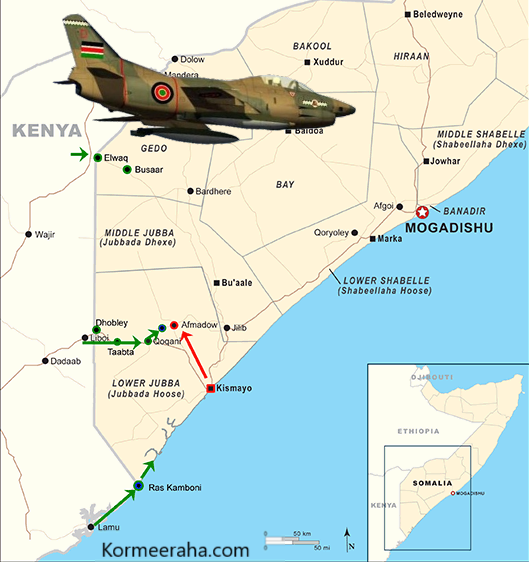
A week ago, Kenyan Air Force indiscriminately bombed rural areas and towns in Gedo’s El-Waq district, a border region between Kenya and Somalia.
The air campaign caused death among civilians, destruction of properties and communication infrastructure, and displaced thousands of residents.
Terror under the Kenyan bombs
Kenya had already undertaken similar airstrike but this one was particularly violent and sustained, according to eye-witnesses. Hardly hit population in Gedo turned out massively to protest this total disregard of their rights and safety a day ago.
Free and privately own media reported on the onslaught but from the national news network, local Jubaland governor, the federal government, AMISOM and the international community kept unusually silent on the issue.
The wider Somali community, locally and on social media shared their dismay and disappointment by the apathy to react to the pain and suffering of an already destitute community hit hard by recent drought, insecurity and poverty.
It is hard to understand the huge contrast between the deafening silence on Kenyan war crimes with the unequivocal reactions to any attack by Al-Shabab. These attacks practically lead the international community to condemn senseless violence in unison. In this current case, lives were lost, property damaged, livelihoods destroyed and people displaced, and the people of El-Waq see that their suffering does not matter.
One wonders what is most important to the West, the declining Al-Shabab militias or the needless loss of life caused by the violence of the Kenyan army under the guise of fighting this group with which they have a strong business relationship.
For Somalis who are paying with their lives, the risk posed by Kenya is much more pressing and must be eliminated at all costs.
If the competition between Al-Shabab and Kenyan troops over who will kill the most Somalis, the public, weary of foreign troops and foreign-funded terrorists, would elect a nationalist government, much to the chagrin of the international community which encourages this cycle of violence by their silence.
Kenya unruly behaviour
The many times Kenya acted this way AMISOM promised to investigate but Somalis in general and victims in particular have yet to hear the outcome of any investigation, if they were ever conducted.
Indeed, it is not the first time Kenya has turned rogue and neither the African Union who supervises AMISOM nor the European Union who funds the mission were able or willing to curb Kenyan troops’ destructive tendencies.
Since its imposition on AMISOM after its illegal invasion of Somalia in 2011, Kenyan Defence Force (KDF) does not notify the African troop’s command of its actions and turns a deaf ear to AMISOM rules of engagement.
Without any repercussions from the African Union or Western countries which swiftly condemn human rights violations and aggression in the region, Kenya has stepped up attempts to undermine the country’s sovereignty, security and development.
Kenyan army has consistently attacked villagers and destroyed Somalia’s economic infrastructure in the border regions for the last ten years. For instance, they repeatedly dynamited mobile phone towers belonging to Hormuud Telecom, the biggest Somali telecommunication company.
Kenyan Defence Forces in Jubaland has been involved in illegal charcoal trade, arms smuggling, prostitution ring, rape, extra-judicial killings, arbitrary detentions and even funding Al-Shabab insurgents.
In short, Kenya has all the characteristics of a rogue state and should not be part of the African mission as its participation is in fact a subterfuge intended to undermine the mission’s objectives and Somalis safety, but above all shows that this expensive mission is dysfunctional.
ICJ and sea case
Kenya, which in the past has always used unscrupulous Somali politicians, is increasingly exasperated that Mohamed Abdullahi Farmajo’s refusal to cede ground in the International Court of Justice (ICJ) maritime case.
In addition, Kenya has tried a range of bullying tactics as well as using its friends to apply strong diplomatic pressure on Farmajo’s administration. But the Somali government has stood firm and Kenya is increasingly reckless to the point of putting AMISOM in a difficult position.
Since the ICJ released two weeks ago a statement that the maritime case between Kenya and Somalia will be made on October 12, Kenya is increasingly acting erratic and warlike. Few days after the announcement, Kenyan media waged a warmongering campaign, smearing the Somali president, Somalia as a whole and labeling it a threat to their country.
Kenyan President Uhuru Kenyatta, who owns personal interests in illegal offshore blocks sold to foreign oil companies, fearing his claim to the Somali Sea will be rejected, has stepped up calls to militarily protect what he thinks belongs to his country.
Last week, dressed in military attire, he inaugurated a navy base in Lamu to patrol the sea and deter Somali fishers and economic activities on that sea claimed by Kenya. In his speech, indirectly geared towards Somalia, he stressed the need for Kenyan military to prepare to defend their land and sea that are under attack.
These activities were followed by these area bombardments on vulnerable rural communities already under Kenya constant harassment since 2011. Many fear however this is a preparation for a ground troops attacks.
